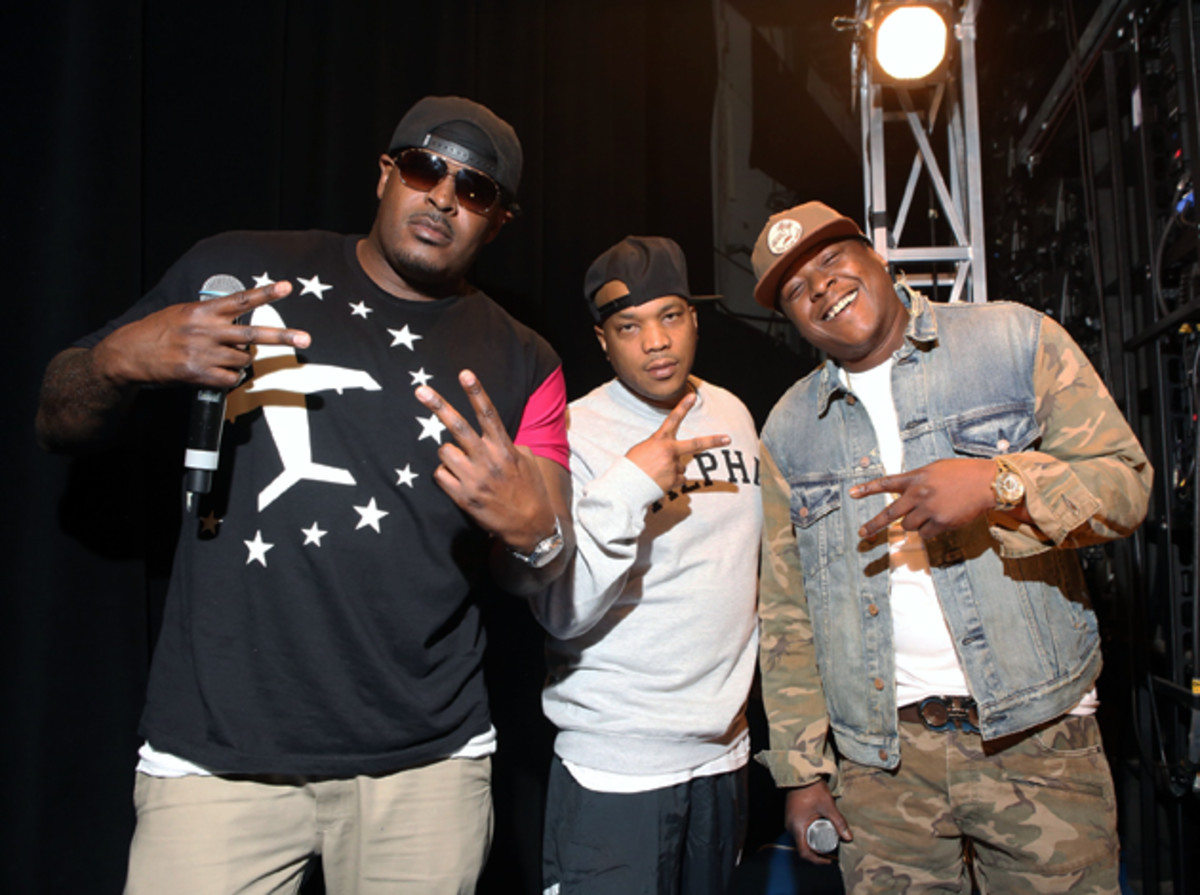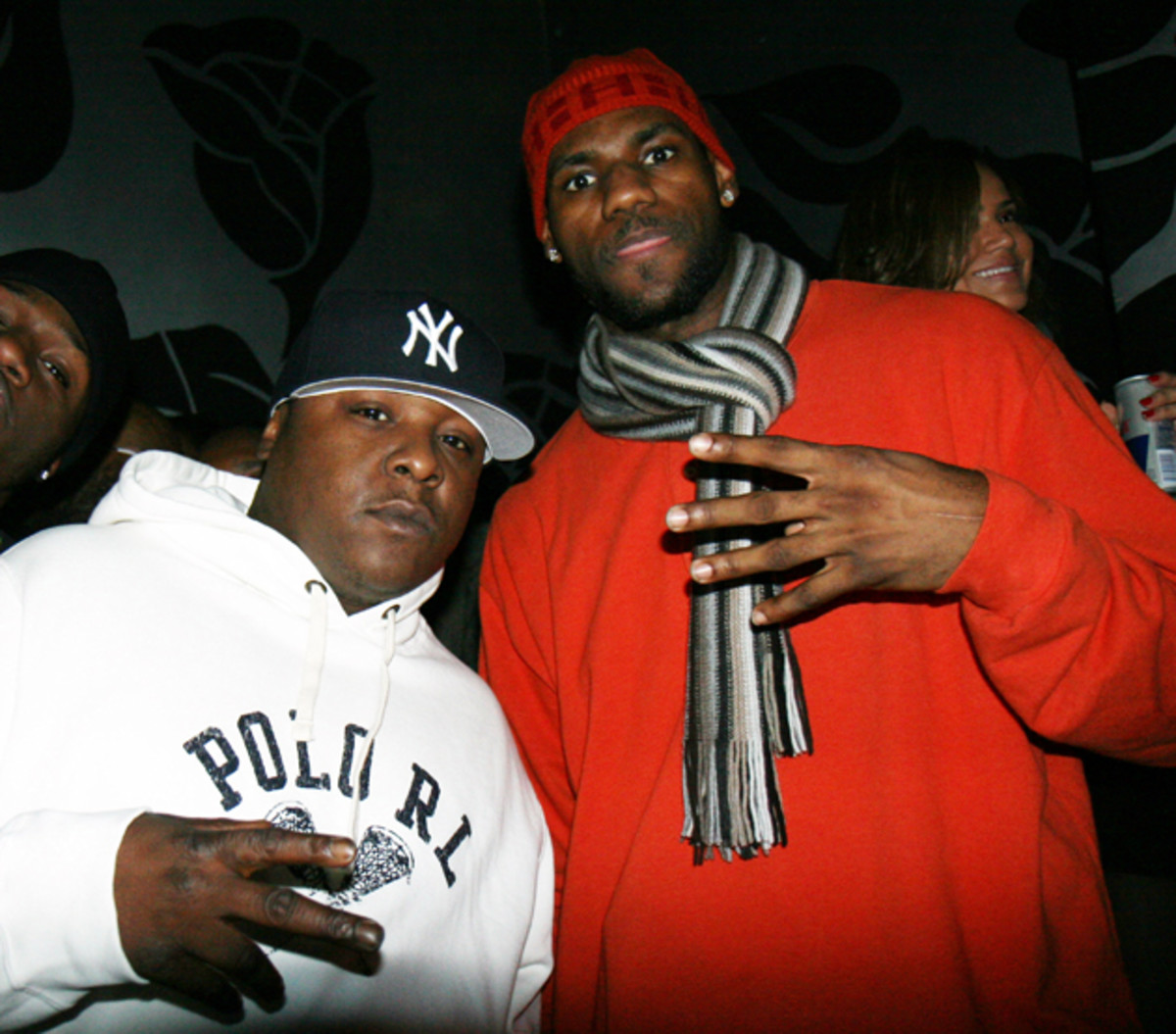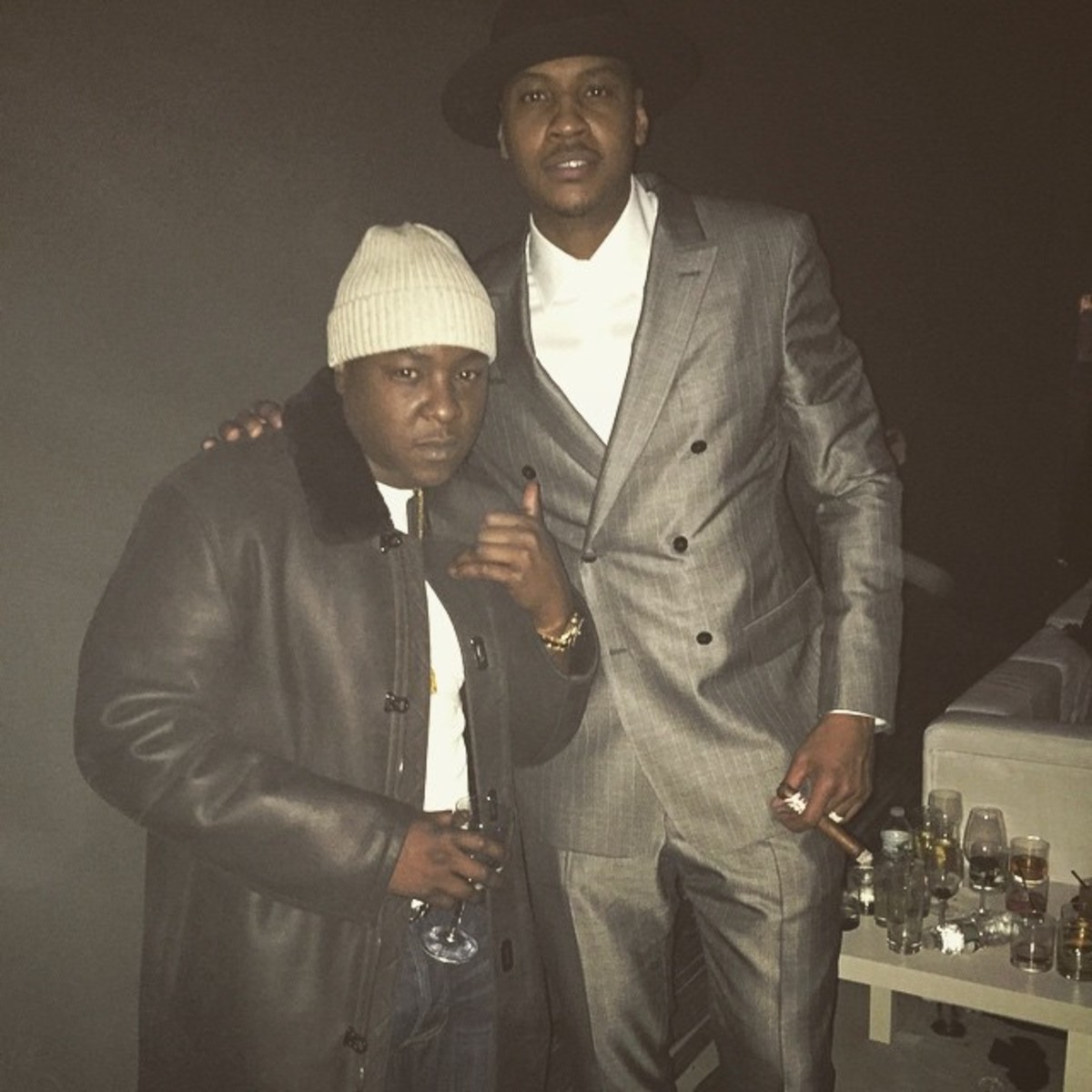Jadakiss talks Iverson friendship, private planes with Carmelo, more

For over 20 years, Jadakiss and his team penned some of the greatest hits of all-time, worked with the top artists and helped the emerging force of hip-hop reach its peak. On stage and under the bright lights of success, the Yonkers native was given opportunities to meet people that he had only dreamed of meeting as a kid growing up. Throughout the years, Jadakiss and players like Allen Iverson, Chris Webber, Jalen Rose and Carmelo Anthony have become close friends, forging lifelong bonds while sharing priceless memories along the way as their lives overlapped in a number of different ways.
SI.com got the chance to talk with Jadakiss at his recording studio in Yonkers, N.Y., discussing everything from where he started in the rap game, what it was like to work with Allen Iverson on those classic Reebok commercials, his favorite All-Star weekend memories, living it up in Vegas with Melo and much more.
*****
Daniel Friedman: Let's start all the way back at the beginning. How'd you first fall in love with music?
Jadakiss: I've always loved music. But listening to the stuff my mom and uncles played, that's what turned me on—and it got me hooked.
DF: How did that evolve into you starting to make your own music?
JK: Since like 8 years old I was flirting with it, getting on my friends and snap rhyming. And then probably after 12, I started trying to make little verses and eventually songs.

DF: You became part of one of the greatest rap groups in history, The LOX. How’d that happen? How did you, Styles P and Sheek Louch all initially meet?
JK: Back in school. You would find the people who think they could rhyme, people who was trying to rhyme, and we all just clicked up. Then it was us versus everybody.
We were from the same crew, and we would call each other every night to see what kind of rhymes [the others] were writing. That was our ritual from like 9th to 10th grade. Every night, call and see if you came up with something crazy. Then we started doing the tapes in high school and selling them. Styles worked at odd jobs, so he had the inside connect on cassettes. Then we stole those printed labels and started selling them for like $10 or $15. That spread [the music], and that was really our first marketing and promotion. And then from school [the tapes] went throughout the town.
We started out as "The Bomb Squad," then we went to "The Warlocks," and eventually became "The LOX" when we got to [Bad Boy Records], and chopped the "war" off.
DF: When was your first big break as a group and how’d it all go down?
JK: The first big break was Diddy. We were recording, just trying to get some good music, get a good demo so we could create some buzz. And once we got the songs that were strong enough, we passed it off to Diddy, and the rest was history.
The first meeting with him, he just wanted us to rhyme. He was on the phone having a conference call or a meeting or something, and he said something like, "Just rhyme." You know, he was acting like he wasn’t listening, but he was. And then everything just started happening.
DF: Who are some of your favorite artists of all-time?
JK: My favorites are Big Daddy Kane, Rakim, Nas, Biggie, Hov (Jay-Z), Kool G Rap, Styles, Eminem, DMX and dudes like that ...
DF: And what about music today? What’s your take on the state of the rap game?
JK: Rap is like a big Ferris wheel. It’s always going to change, every few years. It’s just about staying on the wheel, you know what I mean? The challenge is being able to keep up with the change, and inflicting what you do with that change. That’s how so many dudes get lost or swept under the rug because it ain’t only about what you do, it’s about doing what you do and incorporating it within the wheel. If you can do that, you might have a nice long career. If you can't, you might be a one hit wonder or you’ll just be easily forgotten.
Right now, Drake is doing a pretty damn good job. He’s got good substance, whether it’s an R&B-type of song or he’s just straight rapping. I think that little fallout with Meek [Mill] was good for the culture. [Meek’s] trying to figure out how to rebound right now, but that’s good for music. It’s part of the process. That’s maybe what [Meek] needed, to hit that wall and reevaluate how he’s doing things. I think all that type of stuff is therapeutic for hip-hop. That’s needed every few years. As long as it stays musical, artful and nobody gets hurt, I think it’s therapeutic for music.

DF: What about outside of rap? I was just sitting in the Juices for Life store that you and Styles P opened in your hometown in Yonkers. What's the story behind that?
JK: We’re just at that age in our life. Working out is important, and eating right is important. We spent so many years abusing our bodies with bullshit, it’s just comes to a point. And when it’s cool to do it, everybody will do it. The same way people would listen to our music and go outside and pack a gun, or rob something, whatever the lyrics may be, we’re encouraging people to juice and eat right.
At the same time it’s also just about being business-savvy and young entrepreneurs, using money we made from this industry to take it to the next level, because rap is just a stepping stone anyway. It’s on you to be smart, save some money and open up businesses, instead of just spending money and buying bullshit like chains and cars and a bunch of stuff that doesn't mean anything.
DF: OK, I want to switch gears a little bit and get into your own sports history. When did you first get into playing ball?
JK: My mom got me into sports early, first with baseball and then I took it to basketball and football, just to keep a balance. [Sports] keeps you out of trouble, shows you discipline. It shows you how to win and how to handle losing. I’m glad that I had that experience. I still love sports, and I’ve got probably more friends in the NBA than I do in the rap industry. That just shows you how influential sports are and how it can build bonds and relationships.
DF: What are some of your first memories of that kind of music/sports crossover in your career?
JK: Just meeting Shaq, Jalen Rose, Iverson and dudes like that. You never really know the impact of music on sports until you meet dudes like that—and all of them really love music, and some make music.
And for them to say things like, "You know, this album made me drop 30 points!" That’s just a priceless gift. And meeting guys like Jordan at the Jordan Classic, and him telling me, "Yo, if my son was here he would just tackle you." You know, that’s just a far-fetched fantasy that became a reality. And now, music and sports is becoming an unbreakable marriage that they probably tried to keep under wraps back in the day, but today you just can’t deny it.
DF: When you talk about the NBA becoming more influenced by hip-hop culture, you have to start with Allen Iverson, who was at the forefront of that movement. What do you remember about working with him and just being around him at that time?
JK: He always told me that he loved me as a rapper, so when he called for me to do the commercials for his shoe, it was like the initial breakthrough. That was just showing that the culture was getting stronger. Even my relationship to this day with AI and Reebok, it’s still strong just from that. And it’s about to be 20 years.
I probably met him back in the day years before we did those commercials, just being a fan of his back at Georgetown and following his whole story, but the bond was instant.

What’s one of your favorite stories of experiencing that cultural crossover, maybe one instance where you weren’t in your element?
JK: One story that’s ill was with Melo. You now, Melo’s like my little brother. He was getting snubbed for the All-Star Game a few times early in his career and it was hurting him because he was making it to the playoffs and they were still snubbing him. That’s how me and him sort of got along, we were having a lot of similarities with him in the NBA and me in the industry being overlooked and underrated, and that’s how we clicked. And our birthdays are like a day or two apart, so that made us really link up.
But for one of his early [All-Star] selections, when the game was in Vegas, I flew out to Denver and we got on a private jet and went out there and did the whole weekend. To see him smile and see how happy he was, with his family, and for me to be in the mix that was just a great feeling. They finally recognized [him], and I felt happy for him. And the weekend was great, that was probably one of the best All-Star weekends I’ve been to, just to be with him in the mix happy to make it—it was just a priceless feeling.
DF: Is it easier for artists like yourself to link up with players like Melo in today’s age of social media?
JK: I guess now with social media and people taking control of their branding, they’re letting it go through now. It helps both sides out. I announced the starters for the [Brooklyn] Nets game for opening night. Stuff like that, years ago, I don’t know. I guess the CEOs are recognizing the value. At the end of the day it’s all a business, so they want to sell jerseys, seats and if it’s going to help the business, they’re with it.
DF: And being from New York, I’ve got to ask about the Knicks. What do you think about the team right now with Phil Jackson at the helm and Melo trying to take them to the playoffs?
JK: I’m always Knicks till I die, but for Phil, you’ve gotta give him a chance. You can’t count him out due to the work he’s put in over the years. I’m not going to rush him. You gotta let the zen master do what he do. We gotta give him some time. I’m not going to count him out just yet, and I ain’t going to pat him on the back just yet because we’re still a work in progress.
DF:Lastly, who do you have this year taking the NBA title?
JK: The contenders to win it all? I see Cleveland, the Spurs, and I like the Clippers chances this year. I think those teams are on top. Golden State I think might be able to get back, but I don’t think they can win it again though. I think that was a phase last year.
